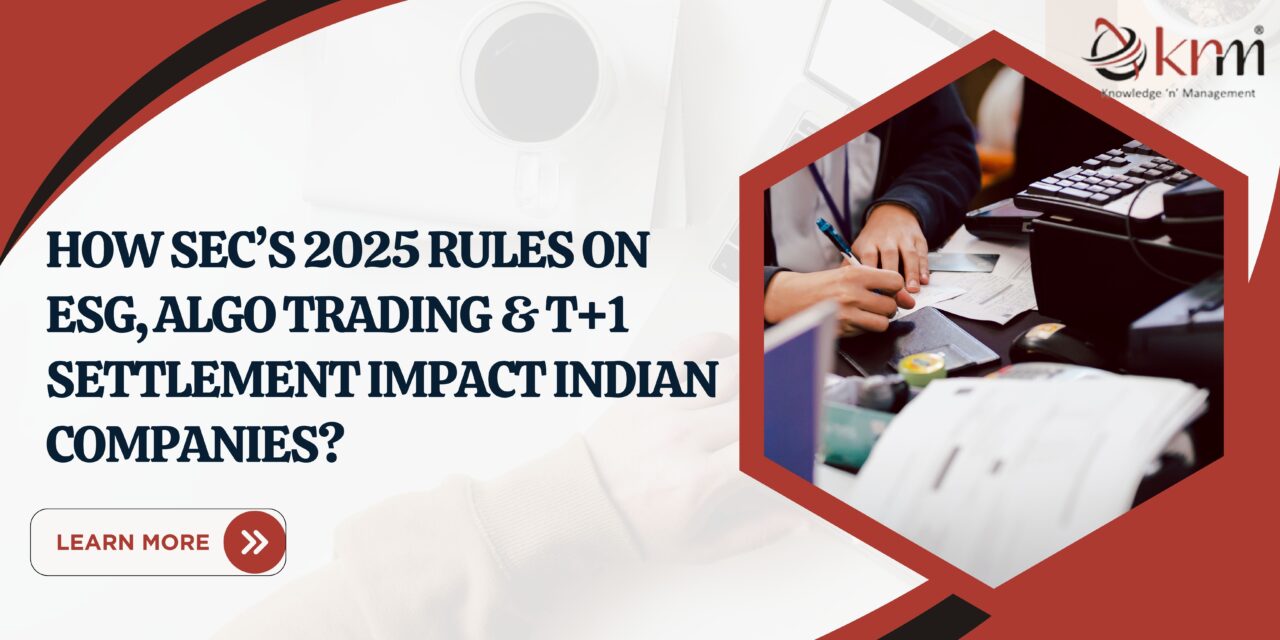Global Regulatory Ripple Effects and India’s Strategic Role
SEC’s 2025 Rules on ESG bring a comprehensive set of regulatory updates from the U.S. Securities and Exchange Commission (SEC) for 2025, reshaping how companies across the globe engage with climate disclosures, technology-driven trading, and settlement systems. While these mandates are designed for U.S.-listed entities and intermediaries, their impact is deeply felt across borders—including India. Indian companies with U.S. investors, global subsidiaries, or fundraising aspirations must align operations with rising global expectations for transparency, data integrity, and proactive governance. At KNM India, our integrated services in ESG Advisory, Compliance & Risk Management, and Corporate Advisory are well-positioned to help organizations navigate these complex transitions with clarity and regulatory alignment.
SEC’s Climate & ESG Disclosure Mandate: A Global Wake-Up Call
One of the cornerstone updates from the SEC is the mandatory disclosure of Scope 1 and Scope 2 greenhouse gas (GHG) emissions, along with board oversight of climate-related risks. For certain companies, Scope 3 emissions (those across the value chain) must also be reported. These requirements align with global ESG reporting frameworks such as TCFD and IFRS-SASB. For Indian companies—especially those backed by U.S. investors, or part of multinational value chains—this calls for early preparation. Notably, India’s own regulator, SEBI, has introduced the BRSR (Business Responsibility and Sustainability Report), which bears strong resemblance to these global standards. KNM India’s ESG Advisory experts assist clients in building ESG disclosure frameworks, emission tracking systems, and governance models that are both globally compliant and locally optimized.
Bridging Global-Local ESG Governance Gaps
As global investors demand deeper accountability on environmental and social impact, Indian promoters, CFOs, and board members must now treat ESG not just as a disclosure, but as a core governance agenda. ESG strategy must reflect operational realities, investor expectations, and regulatory risk. Through our Corporate Advisory and Compliance & Risk Management offerings, KNM India helps businesses develop materiality assessments, ESG risk registers, stakeholder engagement protocols, and internal reporting policies aligned with GRI, SEBI, and international frameworks. We help transform ESG from a compliance checkbox into a strategic advantage.
Algorithmic Trading Scrutiny: SEC and SEBI Move Closer
Another major regulatory area is algorithmic trading. The SEC’s 2025 rulebook mandates disclosures around the use of AI and algorithms in trade execution, including supervision protocols, bias mitigation, and cybersecurity safeguards. These changes are strikingly similar to SEBI’s initiatives in India, which include guidelines on algo trading, API usage restrictions, and testing within regulatory sandboxes. Indian fintech companies, brokers, and asset managers operating across jurisdictions will need to tighten their compliance mechanisms. KNM India’s Compliance & Risk Management team assists in conducting technology risk audits, implementing internal controls for trading systems, and preparing necessary documentation for both Indian and international regulators.
T+1 Settlement Shift: Learning from India’s Head Start
Effective May 2024, the SEC has transitioned U.S. capital markets from T+2 to T+1 settlement cycles—a move already implemented by Indian regulators a year earlier. This global convergence will affect cross-border liquidity management, custodial timelines, and foreign portfolio investor (FPI) strategies. Indian companies dealing with U.S.-based funds or dual listings must reassess their fund movement protocols and operational readiness. Drawing on its strong Corporate Advisory practice, KNM India supports clients in redesigning internal processes, coordinating with depositories, and managing risk under tighter settlement windows.
Cross-Border Regulatory Alignment: SEC 2025 vs Indian Frameworks
| Regulatory Focus | SEC 2025 Update | Indian Counterpart |
| Climate & ESG Disclosures | Mandatory reporting of Scope 1 & 2 emissions, board oversight | SEBI’s BRSR format, MCA CSR requirements |
| Algorithmic Trading | Disclosure of AI use, supervision standards, bias/cybersecurity | SEBI’s algo trading guidelines, API restrictions |
| T+1 Trade Settlement | T+1 cycle effective May 2024 for U.S. markets | T+1 adopted by Indian exchanges in 2023 |
| Cybersecurity Governance | Detailed reporting on cyber incidents and digital risk protocols | SEBI/RBI cybersecurity circulars, IT Act compliance |
Conclusion
The SEC’s 2025 regulatory reforms represent a global benchmark in transparency, digital oversight, and climate accountability. Indian businesses that proactively align with these standards will gain investor trust, cross-border opportunities, and long-term resilience. Whether it’s ESG disclosure strategy, algorithmic compliance, or financial process redesign, KNM India offers a full suite of our advisory experts services. We help our clients not just meet global standards—but lead with them. As the world moves toward synchronized regulation, the smartest businesses will be those that start preparing today.
Connect with KNM’s U.S. liaison or India advisory desk today to benchmark your business against these evolving global norms


